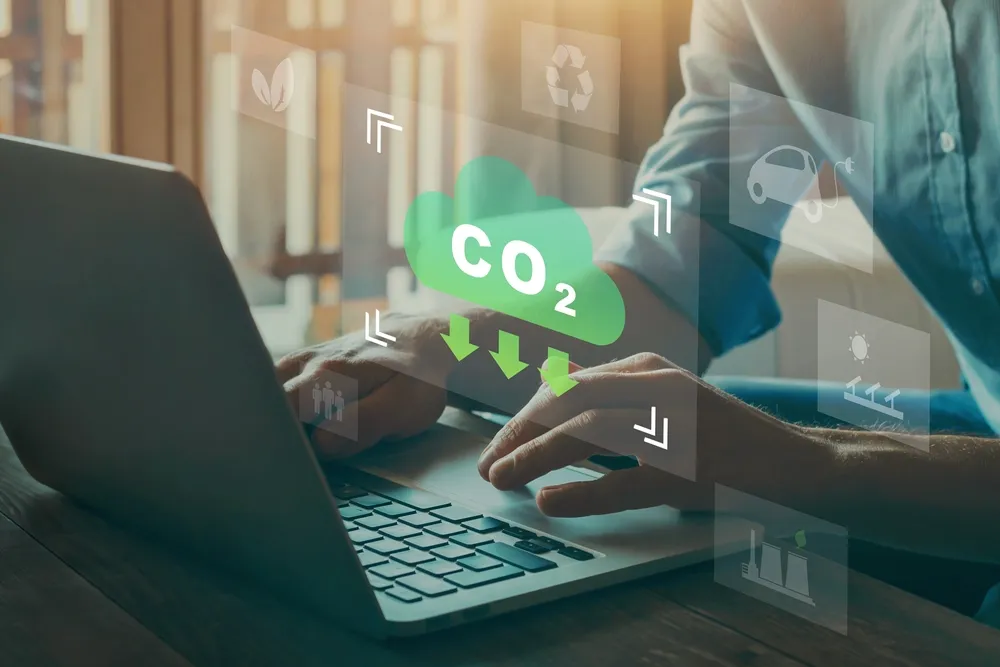Understanding the Business Carbon Footprint
Every business, whether large or small, contributes to the global carbon footprint. This includes energy use in offices, supply chain operations, and often overlooked factors like old electronics and IT hardware. Computers, servers, and office equipment generate significant waste when improperly discarded.
The environmental cost of old electronics is alarming. Manufacturing new IT hardware requires rare earth metals, energy-intensive mining, and complex production processes that release high levels of carbon emissions. When businesses replace computers without responsible disposal, the result is increased e-waste that leaks harmful chemicals into the environment.
This is where business e-waste recycling plays a crucial role. By choosing commercial computer recycling services, companies reduce their reliance on raw materials while actively cutting CO₂ emissions. In fact, every recycled desktop or laptop helps save energy equivalent to powering a household for days.
What Is Commercial Computer Recycling?
At its core, commercial computer recycling refers to the secure and sustainable process of collecting, refurbishing, and recycling IT equipment from businesses. Unlike residential recycling, it’s designed for corporate e-waste disposal, where large volumes of computers and servers must be managed responsibly.
The lifecycle of recycled computers usually includes:
- Collection & Logistics – old computers are picked up from the workplace.
- Data Destruction – secure data wiping ensures no sensitive information is compromised.
- Refurbishment or Recycling – reusable parts are salvaged, while remaining materials are processed responsibly.
- Certification – companies receive documentation proving compliance with green IT asset disposition standards.
This approach helps companies reduce waste, avoid fines for improper disposal, and strengthen their corporate sustainability initiatives.
Benefits of Commercial Computer Recycling
Businesses that adopt electronic waste recycling services enjoy multiple benefits:
- Environmental Benefits: Less mining, fewer greenhouse gas emissions, and more sustainable use of natural resources. Recycling reduces energy demand, resulting in CO₂ savings from electronics recycling.
- Financial Incentives: Many regions offer tax benefits for e-waste recycling, making it a cost-effective solution.
- Reputation Boost: Customers increasingly prefer eco-friendly brands. A visible office computer recycling program strengthens brand loyalty.
How Recycling Computers Reduces Carbon Emissions
One of the biggest advantages of business e-waste management is the direct reduction in greenhouse gas emissions. Here’s how:
- Energy Savings: Recycling an old desktop can save enough energy to power a light bulb for weeks.
- Manufacturing Emissions Avoided: By reusing metals like aluminum and copper, businesses reduce demand for new mining operations.
- Secure Disposal: Secure IT hardware disposal prevents data leaks while ensuring materials are responsibly processed.
Real-World Examples / Case Studies
- A tech firm in California reduced its annual emissions by 15% after launching a corporate computer recycling initiative.
- A finance company in London partnered with a certified e-waste recycler and cut disposal costs by 20% while reducing e-waste carbon emissions significantly.
These examples prove that commercial computer recycling services are not just eco-friendly but also profitable.
Best Practices for Implementing Commercial Computer Recycling Programs
To ensure a successful recycling program, businesses should:
- Choose Certified Recycling Partners – Look for R2 or e-Stewards certified recyclers.
- Set Up On-site or Off-site Collection – Make it convenient for employees.
- Ensure Secure Data Destruction – Always verify that recyclers use proper erasure methods.
Green Certifications & Compliance
Businesses can align their recycling efforts with global standards like:
- R2 (Responsible Recycling)
- e-Stewards Certification
- ISO 14001 Environmental Management Systems
These certifications guarantee compliance and demonstrate a strong commitment to corporate sustainable e-waste disposal.
Steps to Launch a Successful Recycling Plan
- Conduct an E-Waste Audit – Identify old computers, servers, and IT hardware.
- Select the Right Partner – Ensure they are a certified e-waste recycler.
- Train Employees – Educate staff on proper recycling habits.
- Track Results – Report progress to stakeholders to highlight sustainability gains.
Overcoming Common Challenges
- Data Security: Many businesses fear data leaks, but secure computer disposal solves this issue.
- Logistics: Commercial computer recycling near me services often provide pick-up options.
- Budget: With tax benefits for e-waste recycling, cost is rarely a barrier.
Measuring Impact & Reporting Results
Key metrics include:
- Tons of E-Waste Diverted from Landfills
- CO₂-Equivalent Emissions Reduced
- Energy Savings from Recycled Materials
These figures can be included in corporate sustainability reports to showcase impact.
Future Trends in Commercial E-Waste Recycling
- Circular Economy IT Recycling – More focus on reusing and refurbishing.
- Advanced Material Recovery – AI-driven processes to extract rare metals.
- Green IT Asset Disposition – Tech companies prioritizing eco-friendly disposal solutions.
Summary of Benefits & Call to Action
By investing in business e-waste recycling, companies can:
- Lower emissions.
- Save costs.
- Improve their green brand image.
It’s time to act now, launch your corporate computer recycling program, and make sustainability a core business value.
Conclusion
Reducing your company’s carbon footprint doesn’t have to be complicated. By embracing commercial computer recycling, businesses contribute to sustainability, save money, and enhance their reputation. Start with a small step, partner with a certified e-waste recycler, and watch your business grow greener while protecting the planet.
FAQs
Q1. What is commercial computer recycling?
Commercial computer recycling is the eco-friendly and secure disposal of IT hardware from businesses, ensuring data protection and material recovery.
Q2. How does it reduce my company’s carbon footprint?
It reduces CO₂ emissions by lowering demand for new manufacturing and saving energy through the reuse and recycling of corporate electronics.
Q3. Are there financial benefits?
Yes. Many regions offer tax benefits for e-waste recycling, making it both eco-friendly and cost-effective.
Q4. How do I find a reliable recycler?
Search for a certified e-waste recycler or commercial computer recycling near me to locate trusted services.
Q5. Is data security guaranteed?
Yes. Reputable recyclers provide secure IT hardware disposal and issue certificates of data destruction.
Q6. Can small businesses benefit too?
Absolutely! Even recycling old office computers helps reduce emissions and cuts costs for small companies.
